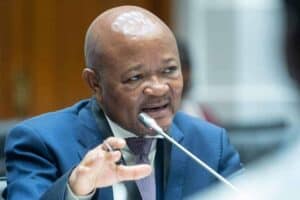Will affordable modular nuclear reactors at R9 billion each be the solution to South Africa’s energy woes?

Will a new, “affordable”, modular nuclear reactor – costing R9 billion each – be the answer to South Africa’s energy crisis.
Some experts believe the new nuclear build proposals – put together by a team of SA scientists led by Dr Kelvin Kemm – offers the country a much cheaper option than some expensive conventional and nuclear projects.
Energy and Electricity Minister Kgosientsho Ramokgopa is set to reveal details of the country’s plans for a new 2 500MW power station by next month.
According to Ramokgopa, the procurement process would require approval from National Treasury, which his team hoped to get before the end of August.
Nuclear move lauded
While independent energy expert Tshepo Mahlaba lauded the nuclear move as “the solution for SA medium and long-term, as it is the cleanest base load power the world has right now”, University of Stellenbosch sustainable development Prof Mark Swilling cautioned that nuclear would take three years to procure and another 10 years to build.
ALSO READ: ‘We are proceeding with it’: Government will defend nuclear power plan – Ramokgopa
Reflecting on whether the R9 billion nuclear initiative could come as a solution to South Africa in terms of costs, Mahlaba said he knew the track record of scientists involved in the project – led by Kemm.
“They are very sober-minded individuals who are patriotic to South Africa. They are choosing an option of small modular nuclear, which is affordable to SA right now,” said Mahlaba.
“Parts and fuel [uranium] will be manufactured in SA and create a very strong industrial and manufacturing base.”
Nuclear cheaper as long-term option
Nuclear, said Mahlaba, was “currently cheaper as a long-term option, compared to renewables, as it lasts for over 80 years – yet solar has to be replaced every 18 years, starting from scratch again.
“Germany’s industrial sector is regretting choosing the renewable option,” he said.
ALSO READ: Nuclear arms spending, arsenals swell as global tensions grow – studies
He conceded that nuclear had “higher start-up costs, but over time its levelised cost of electricity over the years, is much lower than any source”.
France was “the more stable EU country, with more nuclear than anyone in the Europe”.
“It has a stable and cheap electricity, USA has an abundance of nuclear plants, and China has a lot of nuclear plants,” said Mahlaba.
Current geopolitics a factor
Current geopolitics was a factor. “SA is always watched where it procures nuclear because our best friends – Russia and China – are US enemies,” he said.
On former president Jacob Zuma, he said: “The Zuma issue was very unfortunate as he was demonised for choosing Russia.
ALSO READ: Nuclear powerships offer clean baseload electricity at predictable prices – Rosatom
“Russia in nuclear is like SA and New Zealand in rugby, compared to the West.”
Subscribing to a different view, Swilling said: “Look at how long it has taken us to build coal-fired power stations, which should not take us as long as nuclear – meaning, if you want to end load shedding with nuclear, you have to wait longer.
“The reality is that load shedding is going to be ended through a massive or what is referred to as an aggressive approach to renewables, which is the cheapest and quickest way to bring more generation capacity onto the grid.
No load shedding in some time
“We have not had load shedding for quite some time and this is due to the improvement in the performance of power stations, an increase in the number of renewables coming online and the rooftop solar revolution.
“In terms of costs, nuclear is about R2.80 per kilowatt hour, coal R1.40 and renewables are around 60 cents.
ALSO READ: Koeberg 1’s planned availability during winter is off the table
“Across the world, renewables are the cheapest option – attracting normal and discounted finance. Renewables are regarded as low risk and high returns.
“There is no money for coal and no commercial funding for nuclear power stations.”






